Overview
In the demanding world of healthcare, providers often face emotional challenges that can weigh heavily on their ability to deliver compassionate care. Administrative burdens, such as extensive documentation, can divert attention from what truly matters: patient interactions. This is where speech recognition software can play a transformative role.
Imagine a tool that not only enhances efficiency but also improves accuracy in medical transcription. With speech recognition software, clinicians can save precious time, allowing them to focus more on their patients and less on paperwork. This technology reduces documentation errors, fostering a more reliable healthcare environment.
Moreover, it facilitates teamwork among healthcare providers, creating a collaborative atmosphere that ultimately benefits patient care. By streamlining the transcription process, the software supports a more effective and nurturing healthcare setting.
Consider the positive impact this can have on your daily practice. Wouldn't it be wonderful to reclaim time for patient interactions while ensuring accurate documentation? Embracing speech recognition software could be a significant step towards enhancing both your efficiency and the quality of care you provide.
As you reflect on these benefits, think about how this technology could ease your administrative load. It's not just about improving processes—it's about enriching the care you provide to your patients. Explore the possibilities that speech recognition software offers and take a step towards a more compassionate healthcare experience.
Introduction
In a rapidly evolving healthcare landscape, the integration of artificial intelligence (AI) into medical transcription represents more than just a trend—it embodies a transformative shift that has the potential to redefine patient care. Healthcare providers often face the emotional weight of administrative burdens, which can detract from meaningful patient interactions. How often do we find ourselves overwhelmed by paperwork, when our true passion lies in delivering compassionate care?
Innovative solutions like CosmaNeura and DeepScribe are stepping in to alleviate these pressures. By streamlining processes and enhancing documentation accuracy, these AI-powered tools not only save precious time but also empower clinicians to focus on what truly matters: providing high-quality care. Imagine a world where healthcare professionals can dedicate more energy to their patients rather than being bogged down by administrative tasks.
With compelling evidence supporting the efficiency and accuracy of speech recognition technology, the healthcare industry stands on the brink of a revolution. This shift could significantly enhance collaboration, ensure compliance with medical guidelines, and uphold ethical standards, ultimately leading to better patient outcomes. As we embrace these advancements, let us consider how we can work together to foster an environment that prioritizes patient care and supports our healthcare heroes.
CosmaNeura: Streamlining Medical Transcription with AI-Powered Solutions
Healthcare providers often face overwhelming administrative burdens that can detract from their primary focus: patient care. CosmaNeura understands these challenges and leverages advanced AI technology, for medical transcription, to streamline medical transcription processes and significantly reduce the administrative workload. By automating essential tasks such as client intake, documentation, billing, and medical record management, CosmaNeura allows clinicians to concentrate more on delivering compassionate care rather than getting lost in paperwork.
This innovative platform not only enhances efficiency but also plays a transformative role in personalized medicine, ultimately improving patient outcomes. Imagine a world where healthcare providers can dedicate their time to what truly matters—caring for patients. Moreover, CosmaNeura adheres to ethical standards, ensuring that the principles of faith-centered service providers are maintained throughout the transcription process.
Recent statistics reveal that 58% of medical executives intend to adopt or acquire AI solutions within the next year. This highlights an increasing acknowledgment of AI's potential in optimizing medical operations. Furthermore, case studies show that AI technologies could automate up to 30% of hours worked by U.S. medical staff by 2030, particularly in administrative tasks. This shift is crucial, as it allows providers to enhance their focus on delivering quality care while maintaining compliance with ethical guidelines, utilizing speech recognition software for medical transcription. CosmaNeura's AI-driven medical transcription solutions not only enhance efficiency but also align with the mission of faith-based medical services, ensuring that the compassionate spirit of care is preserved. As the landscape of medicine continues to evolve, the integration of speech recognition software for medical transcription emerges as a pivotal advancement, promising to reshape the future of patient-provider interactions. Consider how much more impactful your practice could be with reduced administrative burdens. Embrace the change that AI can bring to your workflow, allowing you to focus on what truly matters: your patients.
DeepScribe: Automating Transcription for Enhanced Clinical Efficiency
DeepScribe stands out as , dedicated to easing the burdens faced by healthcare providers. It automates the transcription of clinical interactions in real-time with speech recognition software for medical transcription, addressing the common resistance to innovation that medical startups often encounter. By capturing the vital discussions between clinicians and patients, DeepScribe ensures accurate documentation without interrupting the flow of care. This alleviates the concerns that many doctors have about how technology might affect their interactions.
Imagine reclaiming precious time while enhancing the quality of your patient connections. DeepScribe not only saves time but also allows practitioners to engage more meaningfully with those they serve. As Clayton Knox, CFO of MedCura Health, insightfully remarked, "Partnering with DeepScribe is one of the best tech decisions we’ve made. Their eagerness to collaborate with us at the business and clinical level is allowing us to scale adoption."
With user satisfaction rates soaring, numerous providers share their experiences of regaining hours previously lost to administrative tasks. This newfound time enables them to focus on what truly matters: delivering exceptional care to their clients. The advantages of speech recognition software for medical transcription extend beyond mere efficiency; they also foster improved job satisfaction among clinicians. Now, healthcare providers can devote more time to their patients while confidently ensuring compliance with ethical standards in healthcare.
Are you ready to embrace a solution that not only enhances your workflow but also nurtures your relationships with patients? DeepScribe is here to support you on this journey, allowing you to prioritize what truly matters in your practice.
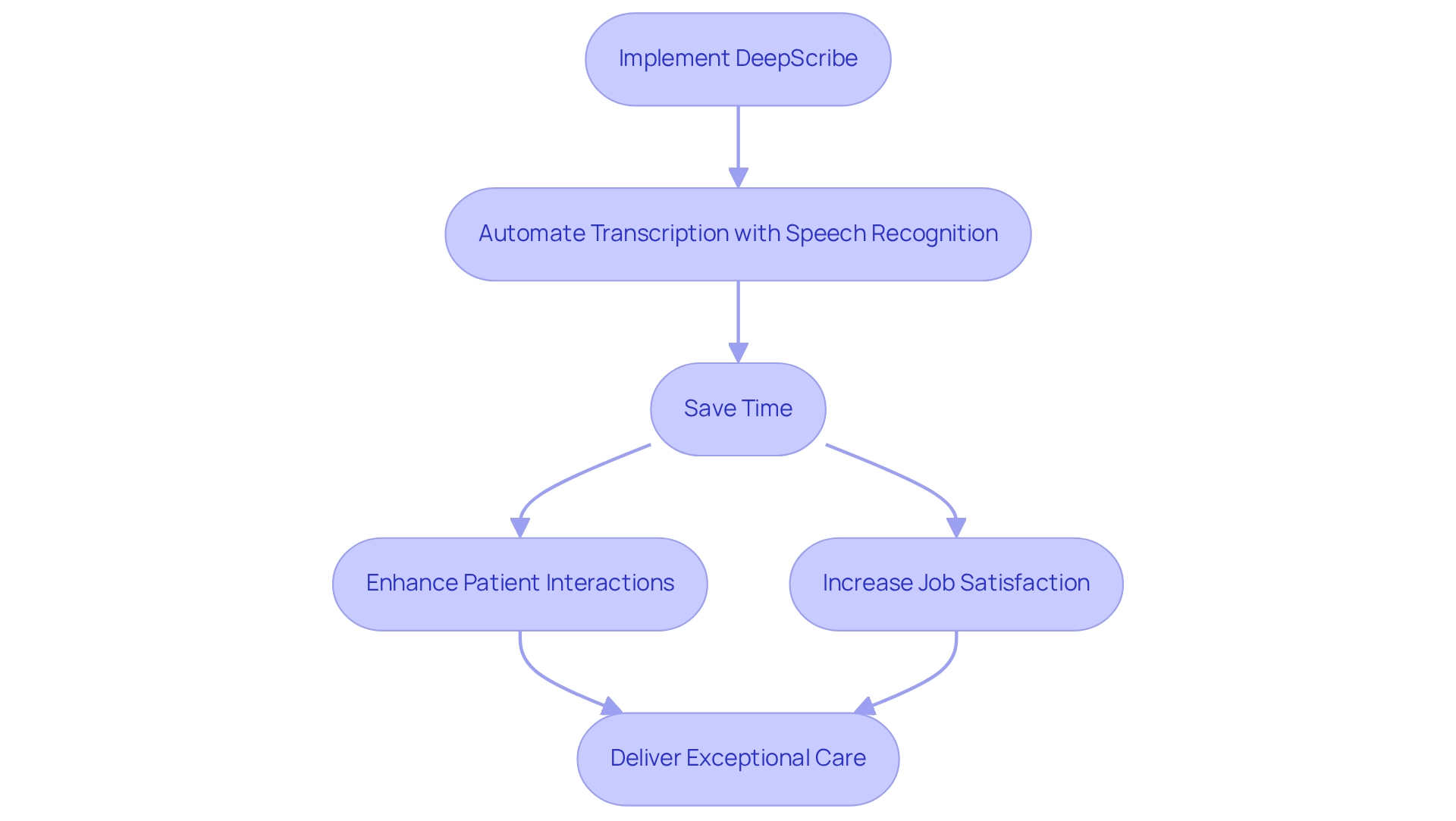
PMC Study Insights: Speech Recognition vs. Standard Transcription Methods
Healthcare providers often face overwhelming administrative burdens that can detract from patient care. A study published in the PMC reveals a promising solution: speech recognition software for medical transcription significantly outperforms standard transcription methods in both speed and accuracy. Clinicians utilizing this technology can complete documentation tasks up to 43% faster than those relying on traditional typing methods. This remarkable efficiency not only reduces the time spent on administrative tasks but also minimizes the risk of errors in patient records.
As Khadijeh Moulaei, , compassionately noted, "The data that support the findings of this study are available from the corresponding author upon reasonable request." This highlights the importance of transparency and accessibility in research. Over the span of more than twenty years, the research examined numerous generations of speech processing technology, highlighting the role of speech recognition software for medical transcription and demonstrating steady enhancements in clinical documentation. These advancements underscore the transformative effect of speech recognition software for medical transcription on medical workflows, ultimately benefiting both healthcare providers and patients.
Consider how adopting this technology could alleviate some of the stress in your daily routine. Imagine spending more time with your patients instead of being bogged down by paperwork. The integration of speech recognition software for medical transcription could significantly enhance not only your efficiency but also the quality of care you provide.
- Faster documentation: Complete tasks up to 43% quicker.
- Reduced errors: Minimize risks in patient records.
- Enhanced workflows: Experience a transformative impact on your daily operations.
Reflect on the potential benefits that speech recognition software for medical transcription could bring to your practice. Embracing these innovations may lead to a more fulfilling and effective approach to patient care.
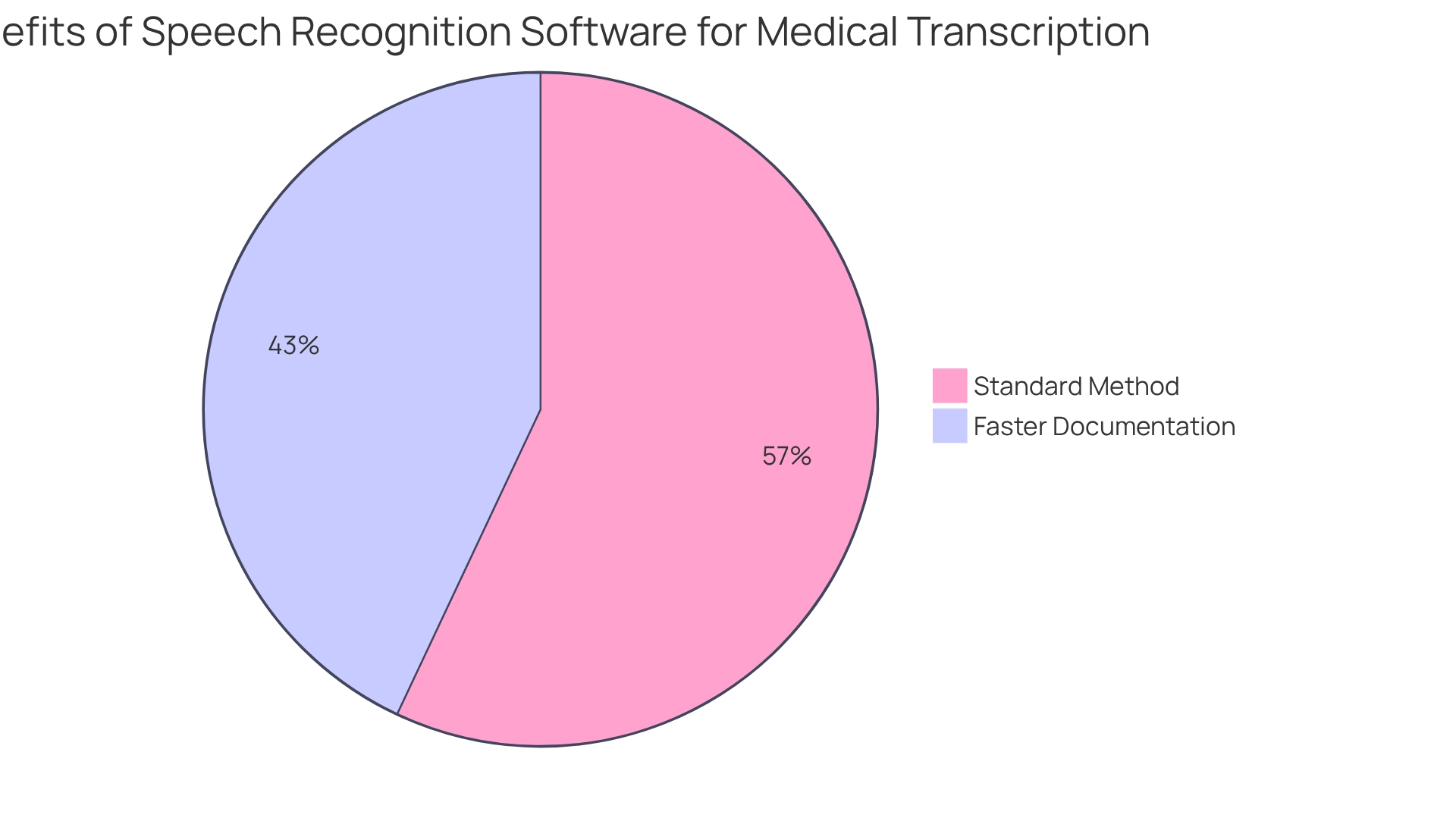
Improved Documentation Accuracy: The Impact of Speech Recognition Technology
Speech understanding technology has profoundly impacted documentation precision in medical settings. By converting spoken language into text with remarkable accuracy, these systems significantly reduce the risk of transcription errors that could lead to misdiagnoses or inappropriate treatments. Improved precision in documentation ensures that medical professionals have reliable information at their fingertips, ultimately enhancing care for individuals.
Before the adoption of speech identification technology, documentation errors were all too common, often resulting in negative patient outcomes. However, with the integration of advanced voice recognition systems, medical facilities have seen a significant decrease in these errors, highlighting the technology's potential to improve clinical decision-making. As noted by ModuleMD, "AI-powered dictation tools represent a promising advancement in the effort to reduce medical errors in healthcare."
Statistics reveal that allow user data to be entered and updated through spoken commands, streamlining the documentation process and directly contributing to better outcomes. As we approach 2025, ongoing advancements in speech processing technology continue to adapt to various accents and speech patterns, further enhancing accuracy over time.
Healthcare professionals should consider implementing speech recognition software for medical transcription to improve documentation precision and elevate overall patient care. By embracing these advancements, they can ensure that individuals receive the best possible outcomes grounded in trustworthy and accurate documentation.
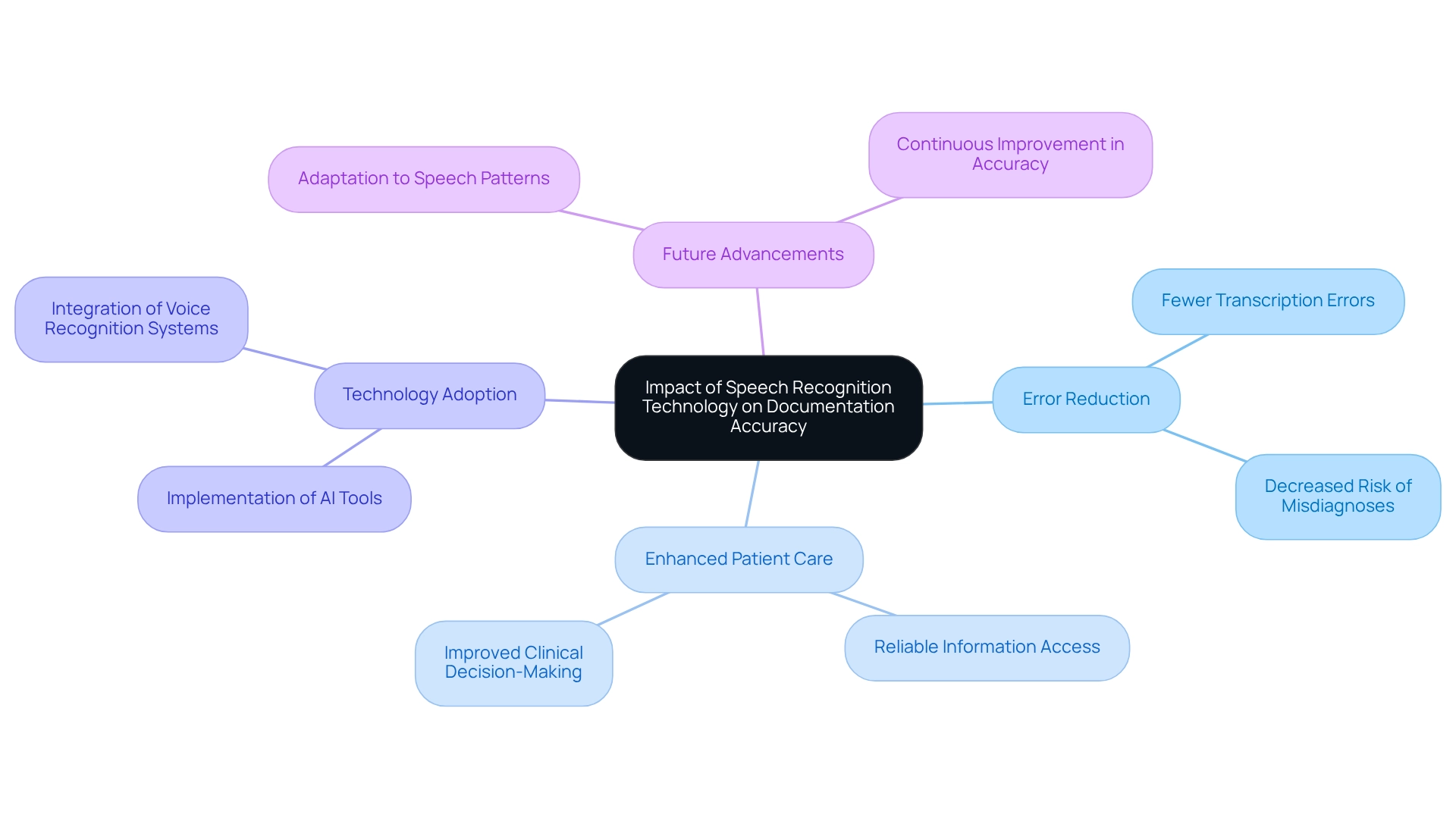
Time Savings: Reclaiming Hours with Speech Recognition Software
Healthcare providers often face overwhelming administrative burdens that can detract from the quality of care they provide. One of the most compelling benefits of speech recognition software is the significant time savings it offers. Research shows that clinicians can recover several hours each week, allowing them to redirect their focus towards caring for individuals. Imagine a family medicine expert who, by using a smartphone-based generative AI tool for documenting and summarizing interactions, can remain fully engaged during consultations. This not only enhances the quality of care but also fosters a sense of job satisfaction among providers.
Studies indicate that reduced documentation time correlates with higher job satisfaction, as clinicians can devote more attention to their patients rather than administrative tasks. Kristin E Yakimow highlights the importance of developing and implementing (EHR) with speech input, noting its impact on the effectiveness of other input methods. However, as Damian Chung points out, medical providers often encounter challenges with various vendors claiming to have AI solutions, raising questions about the true capabilities of these systems.
With average medical transcription expenses reaching approximately $1.49 million, the potential for cost reductions—around $1.37 million—underscores the efficiency improvements achievable through speech processing technology. As we approach 2025, the integration of such software is set to transform medical documentation processes, making them not only more efficient but also less burdensome for healthcare professionals. It's time to embrace these advancements for a brighter future in patient care.
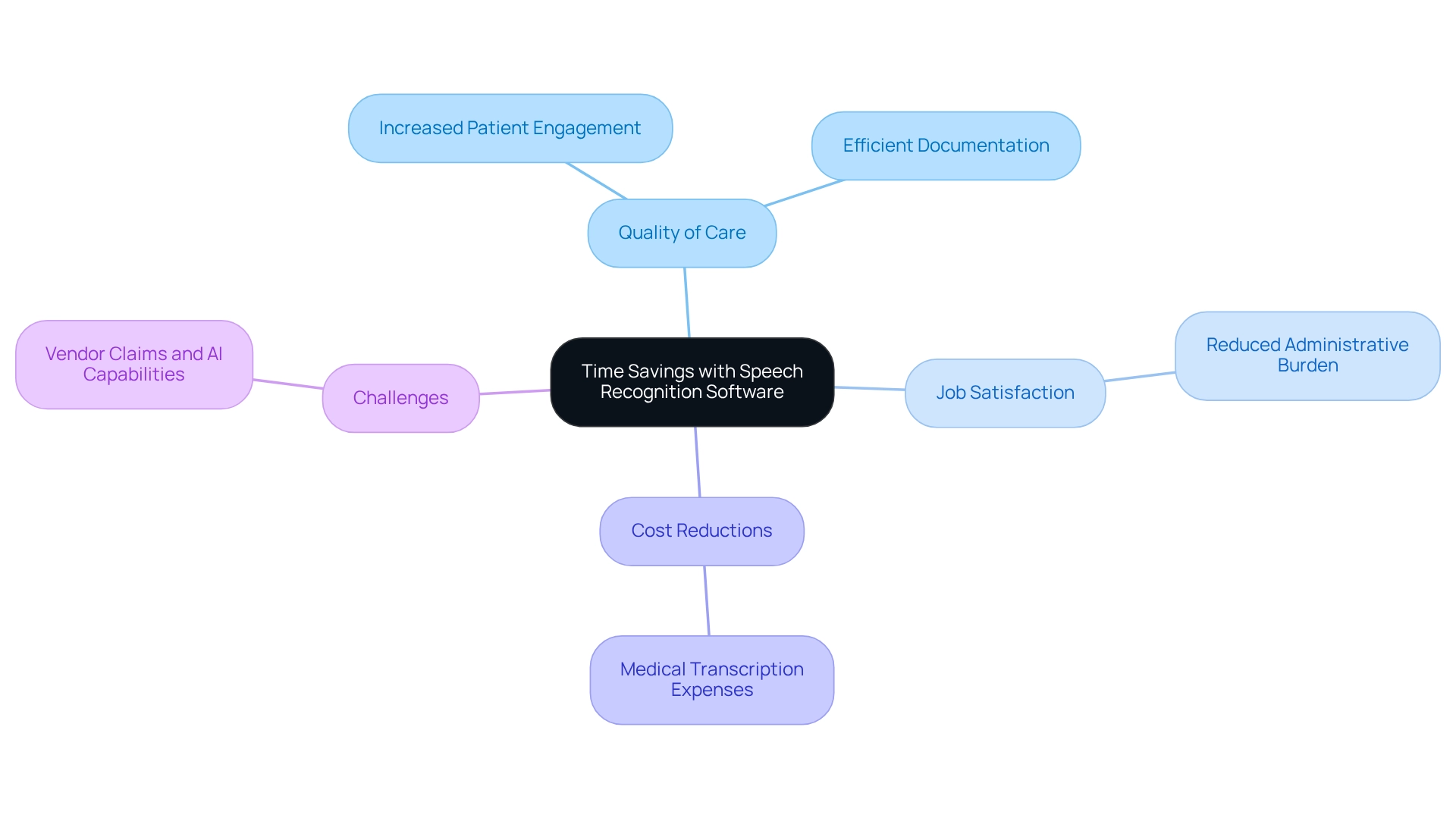
Real-Time Transcription: Enhancing Telehealth Sessions with Speech Recognition
The real-time transcription features of speech recognition software for medical transcription are truly transforming telehealth sessions. Imagine being able to fully engage in discussions with clients, free from the distraction of note-taking. This enhancement not only elevates the quality of interactions but also ensures that accurate records are created on the spot, which is vital for , especially with the use of speech recognition software for medical transcription that has shown significant benefits.
For instance, there has been a notable increase in participant diversity in pharmaceutical trials, with a remarkable 27% rise attributed to telehealth analytics for recruitment. This statistic beautifully underscores the growing importance of telehealth in broadening access to care.
Moreover, a case study from Malaysia illustrates how telemedicine, supported by efficient scheduling and management, has optimized resource utilization and contributed to reduced mortality rates. These outcomes highlight the potential of speech recognition software for medical transcription to enhance the overall quality of telehealth sessions, and expert opinions further reinforce the value of this technology for immediate documentation during patient interactions.
Many providers express that it allows them to concentrate on patient care rather than administrative tasks. This shift not only enhances job satisfaction but also fosters a more empathetic medical environment. As telehealth continues to progress, the influence of speech understanding on documentation requirements will be crucial in shaping better medical outcomes.
How can we further support this evolution in care?
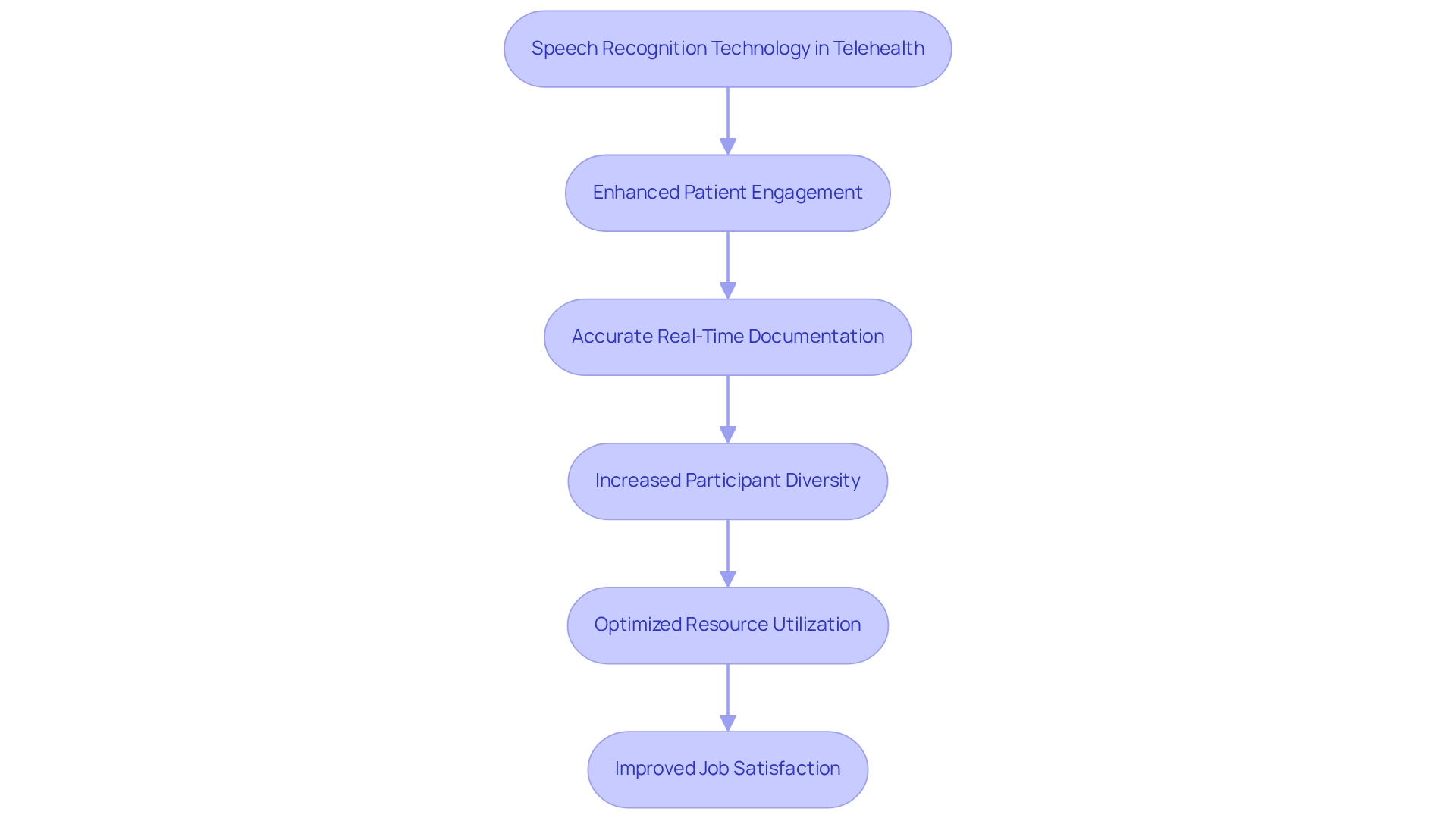
Billing Optimization: Leveraging Speech Recognition for Accurate Service Capture
In the demanding world of healthcare, the emotional challenges faced by providers can be overwhelming. Administrative burdens, particularly in billing processes, can detract from the core mission of patient care. Speech recognition software for medical transcription provides a compassionate solution by ensuring accurate service capture, allowing providers to focus on what truly matters—their patients.
By automatically creating billing codes from recorded patient interactions, medical providers can enhance their revenue cycle. This innovation not only alleviates the administrative workload but also significantly reduces the risk of revenue loss due to coding errors. Imagine the relief that comes with knowing that 48% less processing time is required when workflows are automated with CollaborateMD. This efficiency is not just a statistic; it represents more time for patient engagement and care.
Moreover, as highlighted in the Journal of , the importance of transparency in the medical field is growing. This underscores the necessity for precise service recording in billing practices. Real-world examples, such as those found in the case study "Challenges in Medical Billing Compliance," reveal the compliance issues many practices face. This emphasizes the urgent need for ethical billing practices, which are crucial for maintaining trust and integrity in healthcare.
As we look towards the future, the use of speech recognition software for medical transcription is becoming increasingly vital for improving billing. Specialists emphasize its potential to enhance revenue cycle management and foster financial growth in 2025. How can we support one another in adopting these innovative solutions? Together, we can navigate the complexities of medical billing and ensure that care remains at the forefront of our efforts.
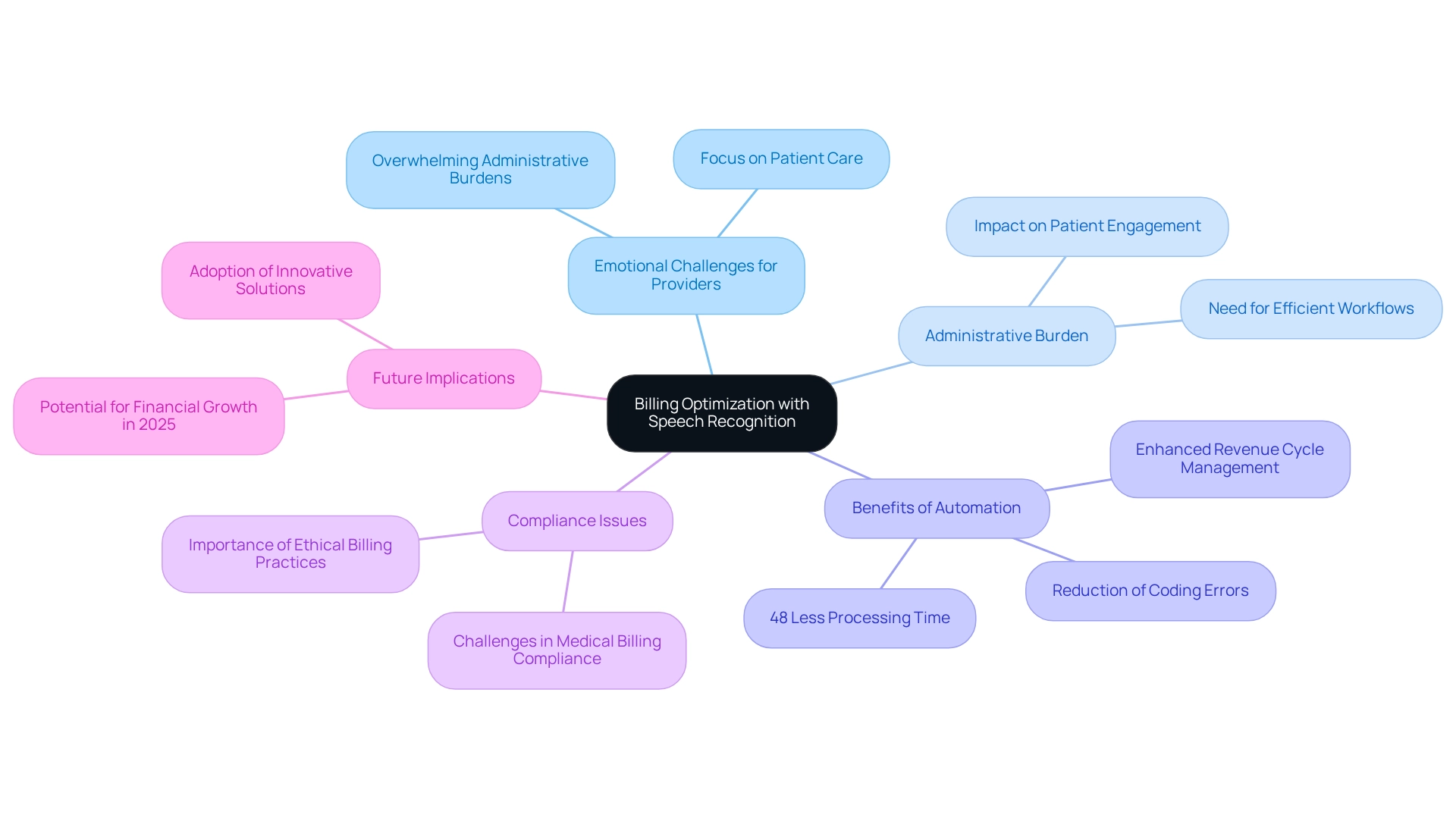
Enhanced Collaboration: Speech Recognition for Multidisciplinary Teamwork
In the demanding world of healthcare, collaboration among multidisciplinary teams is crucial. The process benefits significantly from speech recognition software for medical transcription, which eases the administrative burdens that can weigh heavily on providers. By offering precise and prompt documentation, it ensures that every team member has access to the same information. This alignment is essential for delivering coordinated care and improving health outcomes.
Have you ever felt overwhelmed by the paperwork that distracts from patient care? With speech recognition software for medical transcription, the it fosters allows healthcare professionals to focus more on what truly matters—their patients. When everyone is on the same page, treatment plans can be coordinated more effectively, leading to better results.
Imagine a healthcare environment where information flows effortlessly, and team members are empowered to collaborate without barriers. This technology not only enhances communication but also nurtures a culture of teamwork that benefits both providers and patients alike. By embracing these innovative solutions, we can work together to create a more compassionate and efficient healthcare system.
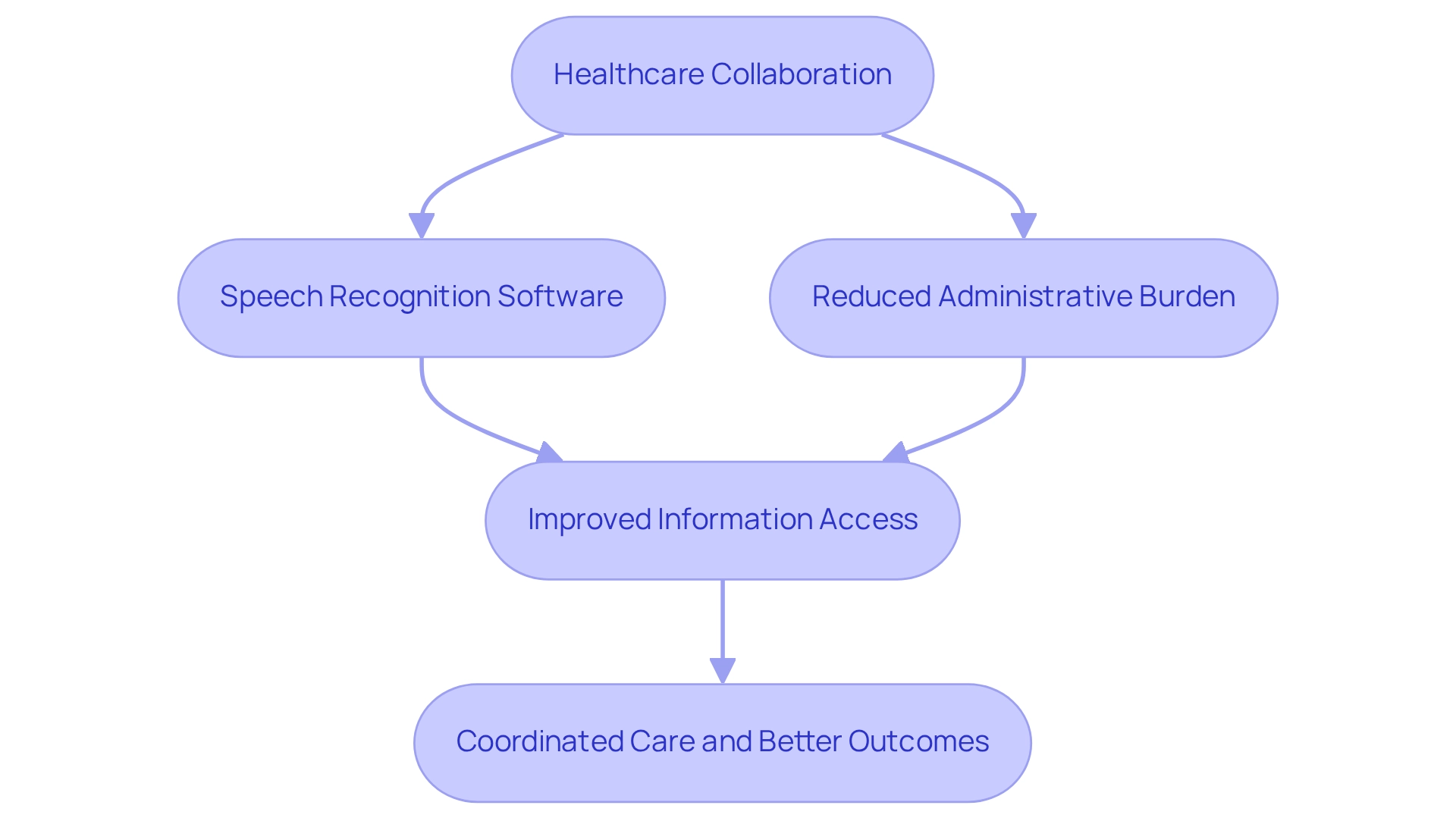
Adapting to Change: Keeping Up with Medical Guidelines through Speech Recognition
Speech recognition technology plays a crucial role in supporting healthcare providers as they navigate the evolving landscape of medical guidelines. Many doctors face emotional challenges, often feeling risk-averse and resistant to change. By seamlessly integrating with electronic health record (EHR) systems, these tools can prompt clinicians with the latest recommendations during interactions. This integration not only simplifies workflows but also ensures that care aligns with the most up-to-date medical standards, significantly improving safety and quality of care.
Research shows that medical practitioners who utilize speech recognition tools are more inclined to follow revised clinical guidelines. This leads to enhanced outcomes for individuals, fostering a sense of fulfillment and connection in patient care. Real-world examples demonstrate that practices employing these technologies have reported a marked increase in compliance with medical standards, showcasing the transformative impact of AI-driven solutions in the medical field.
As Michelle Thompson, DO, , shares, "AI has allowed me, as a physician, to be 100% present for my patients." This statement highlights how addressing concerns about quality of care can lead to personal benefits for healthcare professionals. Furthermore, the challenges faced by medical startups in overcoming resistance to innovation are illustrated through the case study of CosmaNeura, which shows how AI can alleviate administrative burdens and enhance job satisfaction among providers.
By addressing these emotional and practical challenges, the use of speech recognition software for medical transcription reinforces the importance of adapting to change for delivering high-quality care. Consider the following key benefits of integrating such technology:
- Improved compliance with medical guidelines
- Enhanced patient outcomes
- Increased job satisfaction for healthcare providers
By embracing these innovations, we can create a supportive environment that prioritizes both quality care and the well-being of healthcare professionals.
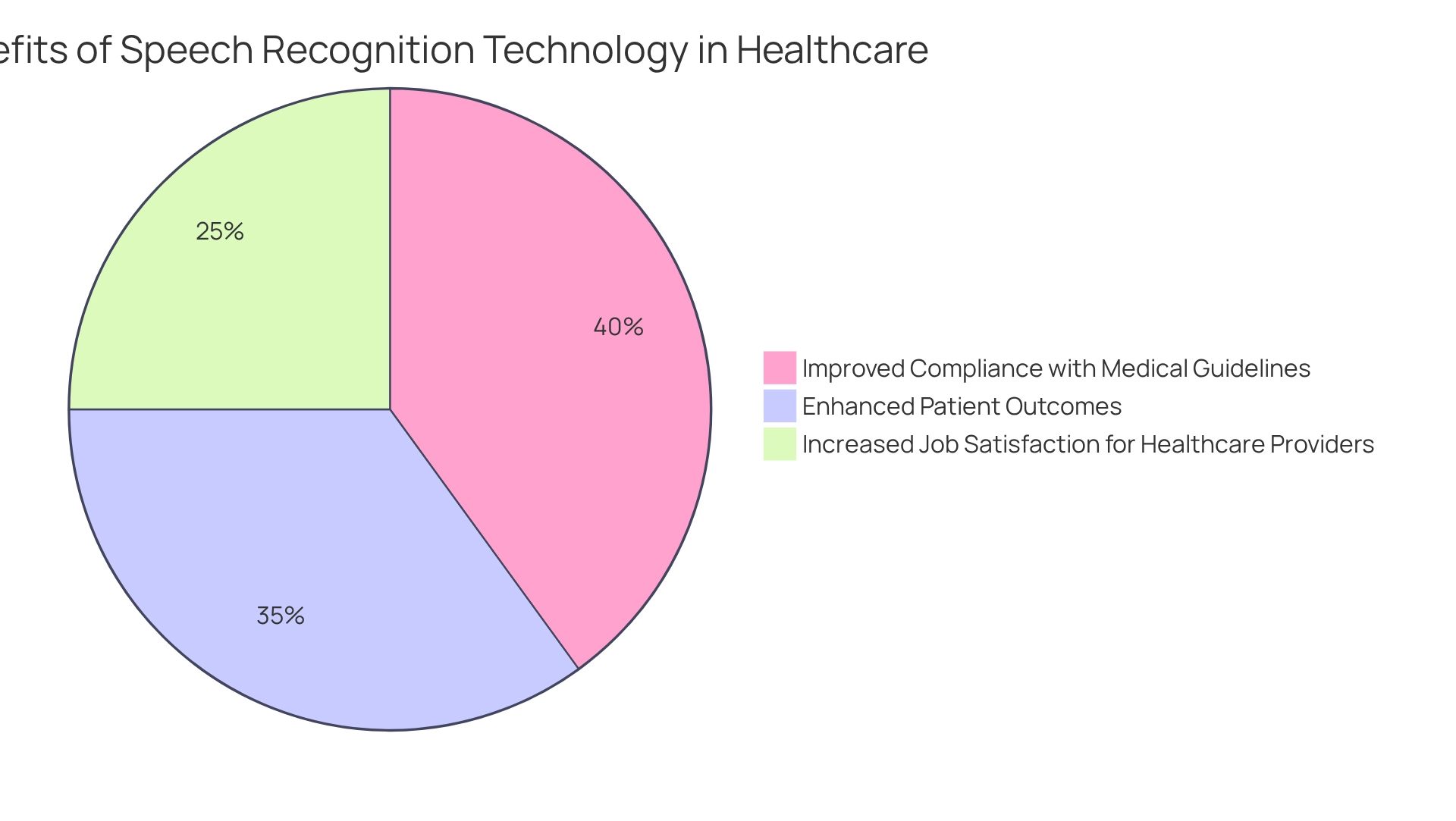
Ethical Considerations: Aligning AI Transcription with Healthcare Values
As the medical sector increasingly embraces AI-driven transcription solutions, we must prioritize ethical considerations while addressing the emotional challenges faced by physicians. At CosmaNeura, we understand the intricacies of the medical system and the daily hurdles that doctors encounter. It is vital that these technologies uphold core medical values—such as confidentiality and informed consent—to maintain trust and integrity in care.
Our commitment to quality evaluation and retrospective assessment of features and products ensures that we continuously refine our solutions to meet the unique requirements of medical providers. A significant 75.7% of radiologists express confidence in AI-based algorithms, showcasing the potential for these tools to enhance clinical workflows while adhering to ethical standards. Real-world examples, such as Clinii, illustrate how AI can streamline care management by integrating and analyzing data from various sources, ultimately supporting informed decision-making.
However, we must remain vigilant regarding the ethical implications of AI in medical settings. Specialists have noted that the increase in electronic communications—up by 57% since the onset of the COVID pandemic—highlights the need for generative AI tools that can convert incoming messages into editable drafts. This innovation can reduce the strain on practitioners and improve efficiency, allowing them to focus more on patient care.
To align AI transcription with medical values, it is crucial to apply existing guidelines for ethical AI usage, ensuring that the confidentiality of individuals is preserved throughout the process. By fostering a commitment to ethical standards and operational efficiency, healthcare providers can effectively leverage speech recognition technology. This not only enhances patient care but also safeguards the trust of their patients.
Let us work together to navigate these challenges, ensuring that technology serves to support and uplift . How can we further enhance our commitment to ethical practices while embracing innovation?
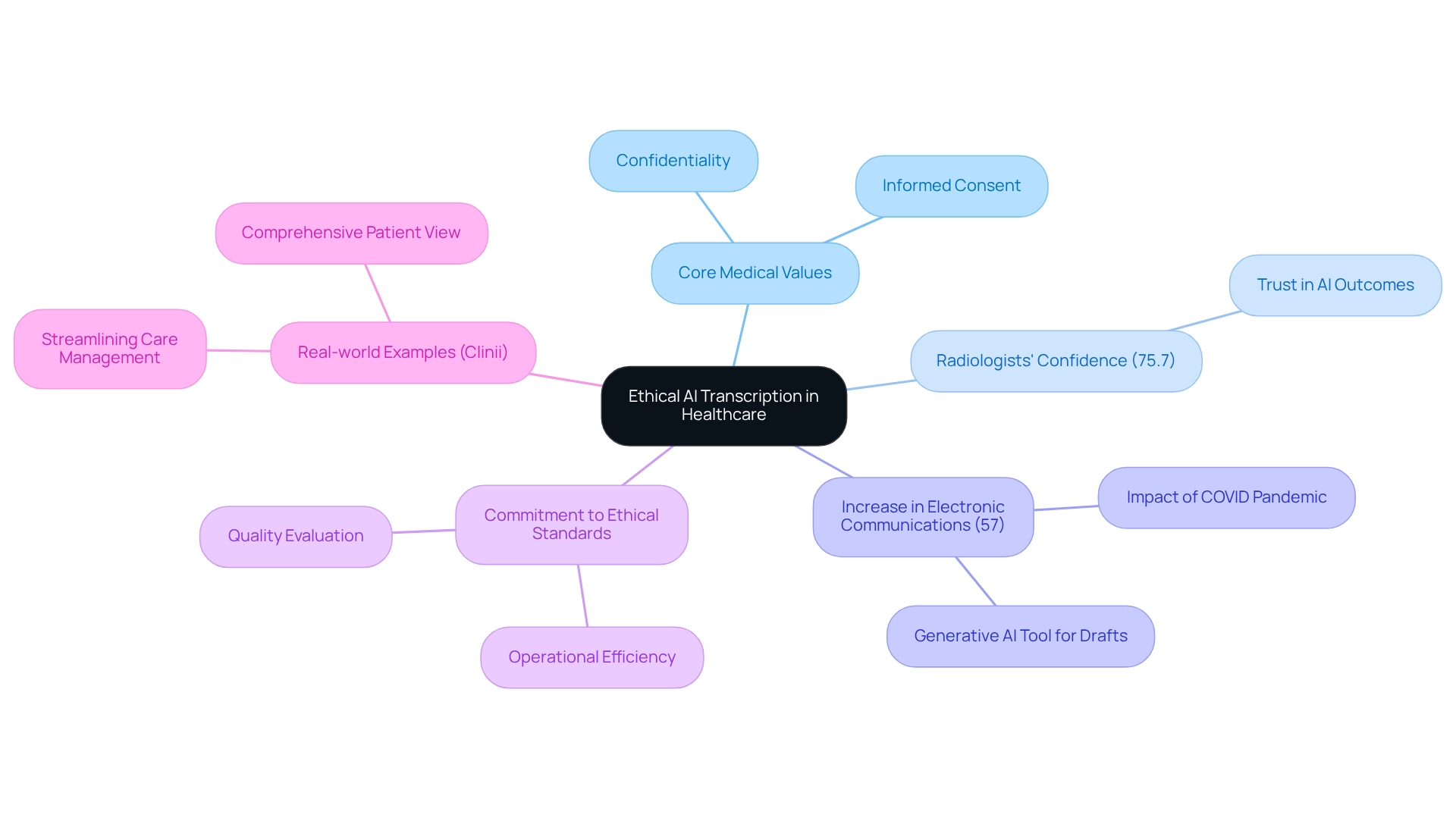
Conclusion
The integration of artificial intelligence in medical transcription is ushering in a new era for healthcare. This shift allows the focus to return to patient care, alleviating the administrative burdens that often weigh heavily on providers. Tools like CosmaNeura and DeepScribe demonstrate how AI can streamline processes, enhance documentation accuracy, and improve overall efficiency. By automating time-consuming tasks, these technologies empower healthcare providers to engage more deeply with their patients. Ultimately, this leads to improved outcomes and greater job satisfaction among clinicians.
Research highlights that the advantages of speech recognition technology extend beyond mere efficiency. They promote enhanced collaboration, adherence to evolving medical guidelines, and ethical considerations that safeguard patient trust. Evidence shows that AI can significantly reduce documentation errors and processing times, positioning the healthcare industry to experience transformative benefits. This is not just a technological upgrade; it is a necessary evolution that prioritizes compassionate care and ethical standards.
As the healthcare landscape continues to evolve, embracing these advancements becomes crucial. By leveraging AI-driven solutions, healthcare providers can reclaim valuable time, enhance patient interactions, and ensure compliance with the highest standards of care. The future of medical transcription is bright, built upon the foundation of technology that respects the values and needs of both patients and providers. Together, let us move forward into this promising future, where compassion and care are at the forefront of healthcare.




